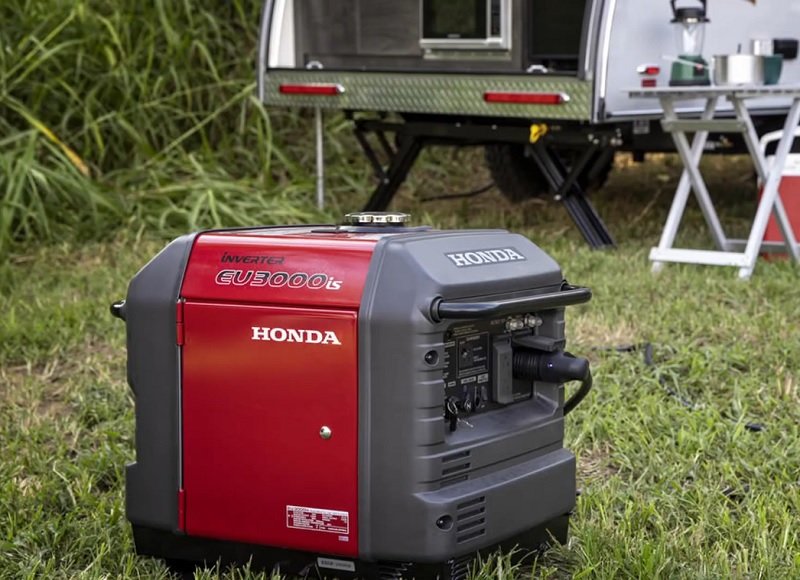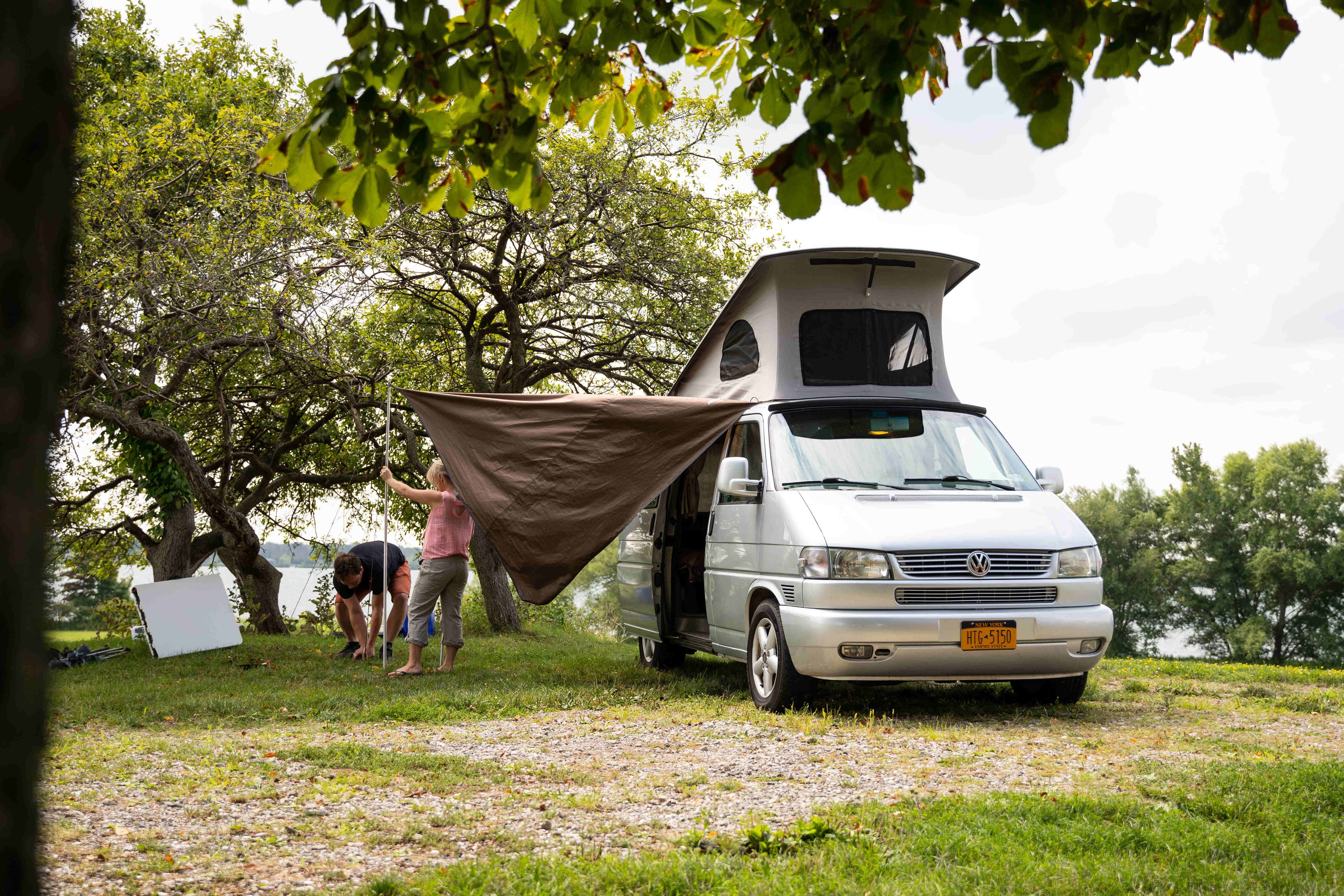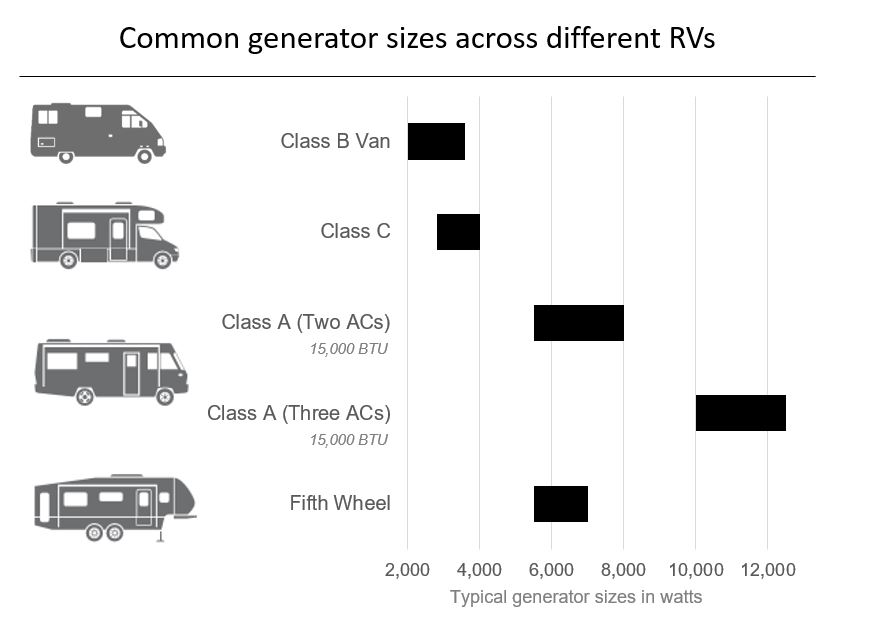Disclosure: This post contains affiliate links and I will be compensated if you make a purchase after clicking through my links. Learn More
A 30-amp RV typically requires a generator with at least 3,000 to 3,600 watts. This ensures adequate power for all appliances.
Choosing the right generator for your 30-amp RV is crucial for a seamless camping experience. A 3,000 to 3,600-watt generator provides enough power to run essential appliances like air conditioners, microwaves, and TVs. It’s important to consider the generator’s noise level and fuel efficiency.
Quiet generators enhance your camping experience without disturbing the peace. Fuel efficiency ensures longer runtimes, which is beneficial during extended stays. Investing in a reliable generator enhances your RV trips, providing comfort and convenience wherever you travel. Always check your RV’s power requirements to ensure you select the best generator for your needs.

Understanding 30 Amp Rvs
Understanding 30 Amp RVs helps ensure you choose the right generator. A 30 Amp RV has specific power needs to run efficiently. Selecting the correct generator size is crucial for a seamless camping experience.
Electrical System Basics
A 30 Amp RV electrical system operates at 120 volts. This setup provides up to 3,600 watts of power. It’s essential to know this for proper generator selection.
30 Amp RVs have a single hot wire, a neutral wire, and a ground wire. The power cable usually has three prongs. Most campgrounds support this setup.
Ensure your generator matches these requirements. A mismatch can lead to electrical issues or damage.
Common Appliances And Their Power Needs
Understanding the power needs of RV appliances is vital. Below is a table of common RV appliances and their typical wattage:
| Appliance | Wattage |
|---|---|
| Air Conditioner | 1,200 – 1,800 watts |
| Microwave | 800 – 1,200 watts |
| Refrigerator | 400 – 600 watts |
| Coffee Maker | 600 – 1,200 watts |
| Television | 100 – 200 watts |
Knowing the wattage helps in managing power usage effectively. For example, running an air conditioner and microwave together requires about 3,000 watts. This is near the maximum capacity of a 30 Amp RV.
Using multiple high-wattage appliances simultaneously can overload the system. Plan your appliance usage to avoid tripping breakers. A generator that provides at least 3,600 watts is ideal for a 30 Amp RV.
For optimal performance, consider a generator with a slightly higher output. This ensures you have a buffer for peak power demands.
Calculating Power Needs
Understanding the power needs of your 30 Amp RV is crucial. It ensures you have the right generator. This prevents overloading and potential damage to your RV’s electrical system. In this section, we will walk you through the steps to calculate your power requirements.
Watts Vs Amps
Before diving into calculations, understand the difference between watts and amps. Watts measure power, while amps measure electrical current. To find out how much power your RV needs, you need to convert amps to watts.
The formula to convert amps to watts is:
Watts = Amps x VoltsFor a 30 Amp RV system operating at 120 volts, the calculation would be:
Watts = 30 Amps x 120 Volts = 3600 WattsThis means your RV can handle up to 3600 watts of power.
Estimating Total Wattage
Now, let’s estimate the total wattage of your RV appliances. Make a list of all appliances and their wattages. Here’s an example table to guide you:
| Appliance | Wattage |
|---|---|
| Air Conditioner | 1500 Watts |
| Microwave | 1000 Watts |
| Refrigerator | 600 Watts |
| Lights | 300 Watts |
| TV | 200 Watts |
Sum up the wattage of all appliances:
Total Wattage = 1500 + 1000 + 600 + 300 + 200 = 3600 WattsThis example shows your RV needs up to 3600 watts to run all appliances. Ensure your generator can handle this load.
Choosing The Right Generator
Choosing the right generator for your 30 Amp RV can be daunting. The right generator ensures your RV has enough power without overloading the system. Below are key factors to consider.
Inverter Vs Conventional Generators
Inverter generators are quieter and more fuel-efficient. They provide cleaner power, which is safe for sensitive electronics. These generators are also more compact and portable. This makes them ideal for RV use.
Conventional generators are usually more powerful and less expensive. They can handle larger loads but are louder. They are also bulkier and less fuel-efficient. Choose based on your power needs and preferences.
Fuel Types And Efficiency
Generators come in various fuel types. The most common are gasoline, propane, and diesel. Each fuel type has pros and cons.
- Gasoline: Readily available, but less efficient. It has a shorter shelf life.
- Propane: Burns cleaner and has a longer shelf life. It may be less efficient.
- Diesel: More efficient and lasts longer. Diesel generators are louder and cost more.
Fuel efficiency is crucial for long trips. A table below can help compare fuel types:
| Fuel Type | Pros | Cons |
|---|---|---|
| Gasoline | Widely available | Less efficient, short shelf life |
| Propane | Cleaner, longer shelf life | Less efficient |
| Diesel | More efficient | Louder, more expensive |
Choose the fuel type that best meets your needs and travel plans.
Top Generator Models for 30 Amp RVs
Finding the right generator for your 30 Amp RV can be tricky. A good generator keeps you powered up wherever you go. Let’s look at some top generator models that work well with 30 Amp RVs.
Portable Options
These generators are easy to move and store, making them great for travel and camping.
Honda EU3000iS
- Power: 2800 watts
- Fuel: Gasoline
- Weight: 131 lbs
The Honda EU3000iS is a top pick for RV owners. It’s known for being quiet, which is great for campgrounds. This generator is fuel-efficient, running up to 20 hours on a single tank. It’s a bit heavy at 131 lbs, but it comes with wheels for easy moving. The 2800 watts of power is enough to run most RV appliances, including air conditioners. It has a clean power output, safe for sensitive electronics. The downside is its high price, but many users say it’s worth it for the reliability and quality.
Champion 3400-Watt Dual Fuel
- Power: 3400 watts
- Fuel: Gasoline or Propane
- Weight: 95.7 lbs
The Champion 3400-Watt Dual Fuel generator is a versatile choice. It can run on both gasoline and propane, giving you more options on the road. At 95.7 lbs, it’s lighter than the Honda, making it easier to move around. The 3400 watts of power is enough for most RV needs, including running an air conditioner. It’s relatively quiet and has a built-in surge protector. The generator also comes with a 3-year warranty. While it may not be as fuel-efficient as the Honda, its dual-fuel capability and lower price make it a popular choice.
WEN 56380i
- Power: 3800 watts
- Fuel: Gasoline
- Weight: 99.2 lbs
The WEN 56380i offers the most power in this portable group. At 3800 watts, it can handle bigger power needs, good for larger RVs or when you need to run multiple appliances. Despite its power, it’s still relatively light at 99.2 lbs. This generator is quiet and has a fuel shut-off feature that uses up the remaining fuel in the carburetor before shutting down. This helps prevent build-up and keeps the generator running smoothly. It also has USB ports for charging small devices. While not as well-known as Honda or Champion, WEN offers good value for the power output.
Stationary Options
These generators are meant to stay in one place. They’re great for long-term or frequent use.
Generac GP3000i
- Power: 3000 watts
- Fuel: Gasoline
- Weight: 59.5 lbs
The Generac GP3000i is surprisingly light for a stationary generator at just 59.5 lbs. It offers 3000 watts of power, enough for most RV needs. This generator is quiet and has a built-in handle for easy carrying. It has a PowerRush feature that delivers over 50% more starting capacity, great for appliances that need extra power to start up. The generator also has USB outlets for charging small devices. While it’s listed as stationary, its light weight makes it portable too. It’s a good choice for RV owners who want a mix of power and portability.
Westinghouse iGen4500
- Power: 4500 watts
- Fuel: Gasoline
- Weight: 98 lbs
The Westinghouse iGen4500 packs a lot of power in a relatively compact package. With 4500 watts, it can run multiple RV appliances at once, including air conditioners and microwaves. It’s quiet for its size and has a digital display that shows fuel level, power output, and run time. The generator can run up to 18 hours on a single tank. It’s also remote start capable, which is handy. At 98 lbs, it’s not the lightest, but it has built-in wheels and a telescoping handle for easy moving. For RV owners who need extra power, this is a solid choice.
DuroMax XP4400E
- Power: 4400 watts
- Fuel: Gasoline
- Weight: 127 lbs
The DuroMax XP4400E is the heaviest option here, but it offers robust power. It provides 4400 watts, enough to run multiple RV appliances simultaneously. This generator has both electric and recoil start options. It’s louder than some other models, but it’s powerful and durable. The generator has a low oil shut-off feature to protect the engine. It also comes with a wheel kit and handles for mobility despite its weight. While it’s not as fuel-efficient as some other models, it’s a good choice for RV owners who need a lot of power and don’t mind the extra weight.
Installation Tips
Installing a generator for your 30 Amp RV requires careful planning. You need to follow specific steps to ensure a smooth installation. Below, we provide essential tips for a successful setup.
Safety Precautions
Prioritize safety when installing your generator. Follow these key safety tips:
- Turn off all power sources: Ensure your RV is disconnected from any power sources.
- Wear protective gear: Use gloves and safety glasses to protect yourself.
- Read the manual: Follow the manufacturer’s instructions for your specific generator model.
- Check the fuel system: Ensure there are no leaks in the fuel lines.
- Proper ventilation: Install the generator in a well-ventilated area to avoid carbon monoxide buildup.
Connecting To Your Rv
Connecting the generator to your RV requires precision. Follow these steps:
- Locate the power inlet: Find the 30 Amp inlet on your RV.
- Use the correct cord: Utilize a 30 Amp RV extension cord.
- Secure the connections: Ensure all connections are tight and secure.
- Test the setup: Turn on the generator and check the RV appliances.
Below is a quick reference table for power requirements:
| Appliance | Power Usage (Watts) |
|---|---|
| Air Conditioner | 1500 – 2000 |
| Microwave | 900 – 1200 |
| Refrigerator | 400 – 600 |
| TV | 100 – 150 |

Maintenance And Care
Taking care of your 30 Amp RV generator is vital. Proper maintenance ensures it runs smoothly and lasts longer. Below are essential tips on how to maintain your generator effectively.
Routine Checks
Performing routine checks is crucial. Inspect the oil level regularly. Change the oil every 100 hours of use. Check the air filter and clean or replace it as needed. Ensure all connections are tight. Look for any signs of wear or damage.
- Check oil levels every use
- Change oil every 100 hours
- Inspect and clean air filter
- Ensure all connections are tight
Troubleshooting Common Issues
Sometimes, your generator may face issues. Here are some common problems and solutions:
| Issue | Solution |
|---|---|
| Generator won’t start | Check fuel levels and spark plug |
| Low power output | Inspect and clean the air filter |
| Overheating | Ensure proper ventilation |
Follow these troubleshooting tips to keep your generator running smoothly.

Frequently Asked Questions
What’s the difference between 30 amp and 50 amp RV power?
A 50 amp RV service provides more power than a 30 amp. It has two 120-volt legs, giving 100 amps at 120 volts. This allows you to run more appliances at once, like multiple air conditioners.
How long can I run my 30 amp RV on a generator?
The run time depends on your generator’s fuel capacity and power output. Most portable generators can run 8-20 hours on a full tank. Always check your specific generator’s specs and monitor fuel levels to avoid power interruptions.
What happens if I exceed 30 amps in my RV?
If you draw more than 30 amps, you’ll likely trip the circuit breaker. This safety feature prevents overheating and electrical fires. If it happens often, you may need to use fewer appliances at once or consider upgrading to 50 amp service.
Can I upgrade my 30 amp RV to 50 amp?
Upgrading from 30 amp to 50 amp is possible but complex. It involves rewiring your RV’s electrical system and replacing appliances. It’s best done by a professional and can be costly.
Can a 4,000-watt generator run a 30 amp RV?
Yes, a 4,000-watt generator can comfortably power a 30 amp RV. A 30 amp RV service provides up to 3,600 watts (30 amps x 120 volts), so a 4,000-watt generator gives you some extra headroom. This means you can run most of your RV appliances, including an air conditioner, without worry.
Is 3,000 watts enough for a 30 amp RV?
Yes, 3,000 watts can cover basic needs for a 30 amp RV, but it might be tight. A 30 amp service can use up to 3,600 watts, so a 3,000-watt generator is slightly under this maximum. You’ll be able to run essential appliances like a refrigerator, lights, and charging devices. However, you may need to be more careful about power management. Running an air conditioner, which typically needs 1,500-2,000 watts to start, might be challenging. It’s a good idea to prioritize your power needs and possibly stagger the use of high-draw appliances.
Final Words
Selecting the right generator for your 30 Amp RV ensures a smooth and enjoyable trip. Consider power needs and generator features. Prioritize reliability and efficiency for the best experience. A well-chosen generator enhances comfort and convenience, making your RV adventures memorable.
Always prioritize quality and performance when making your choice.








